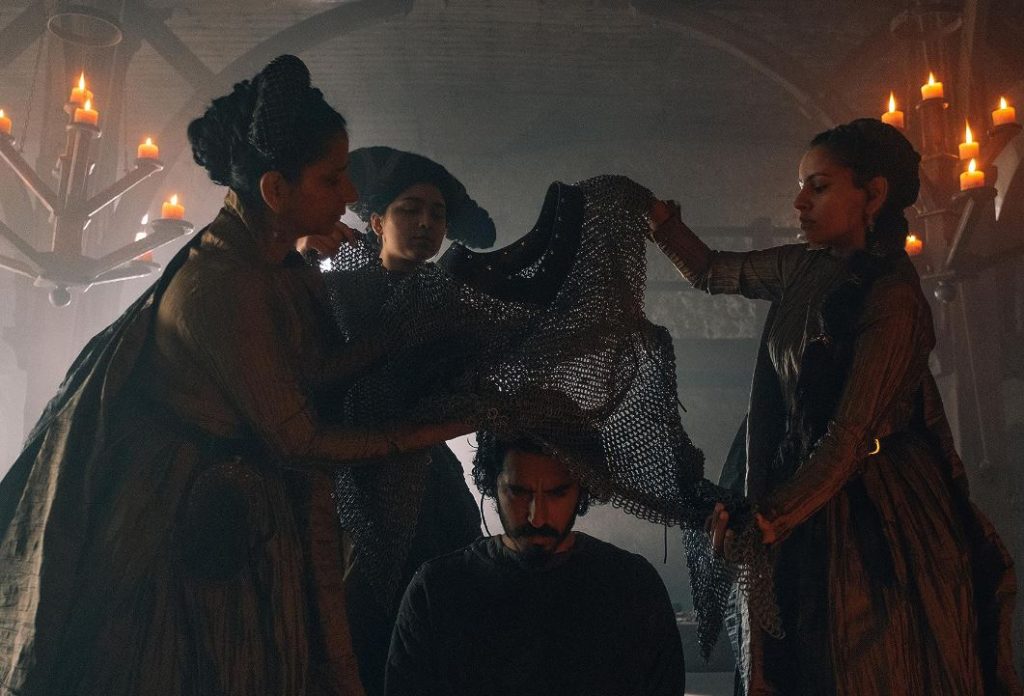
We all heard the pipes begin to play for cinema, didn’t we? I did. Then, from nowhere and without warning, somebody made The Green Knight and gave us hope.
It is a Christmas film, in the real sense, the actual high-holy-day-of-the-Christian-calendar sense (Die Hard can drop reeling from the top of Nakatomi Plaza for all I care), in that it not only, and merely, and arbitrarily, occurs at Christmas (That is Die Hard’s entire justification for calling itself a ‘Christmas movie’–a movie that was, you know, released in July!) but it is both literally and metaphorically about Christianity.
Rebirth. Or, better framed, ‘second birth’, is the metaphorical Christmas hidden in the medieval story. Rebirth or ‘second’ birth of whom, pray, sire. The Christian. The man. The knight. The nation.
But reborn from what into which? I pray for your patience, great liege.
The Christian, from sinner; from besotted self-indulger into one keenly aware of his spiritual failures.
The man, from child-like bystander, from one who needs rescue and whose words are weightless, to principal actor, prime mover, where one’s word is a bond more unbreakable than iron, whom no one defends, whom no one cradles, and who alone bears the consequences of his shortcomings.
The Knight, from unstoried bachelor to honorable legend.
And the nation, from pagan nature worship common to all countries, to a refined, morally clear, and Divinely Deserving™ nation, then a great rarity, because though the original poem is from the 15th century, it’s set somewhere around the 7th or 8th.
All the stories of Arthur are generally about this last point. Arthur was not the first king of Britain, he was the first Christian king of Britain, (remember Old King Cole, the merry old soul? A pre-Arthurian pagan king, that rhyme is literally the only description of his reign that we have) was surrounded on all sides by the paganism that infected his society, son of a pagan, offered to pagan gods as a baby (his name means Worshipper of Thor), sister a witch…there is a respectable stable of analysts who believe Arthur himself is a myth and serves merely as a metaphor for the Christianization of Britain and, by extension, the West.
But Sir Gawain and the Green Knight was more ambitious than that, as all the stories of the Knights of the Round were supposed to illuminate a single lesson of Chivalry, this poem aimed, in the failure and fear of Arthur’s nephew, to illuminate them all.
And they started with a real stock case. “Frat Chad” is the phrase that comes to mind when I think of Gawain (pronounced Gar-win in the film), a wine-drinkin’, dice-rollin’, praise-seekin’, dick-slingin’ wastrel who’s never done a knightly act in his over-indulged life. He has one saving virtue, he knows this about himself and is rightly ashamed of it.
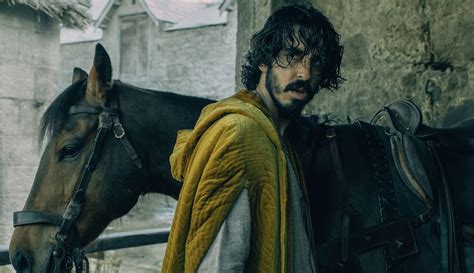
“I can’t spend the winter in Staad again, mom. The swiss have no sense of humor when it comes stealing cop cars or drunkenly firing machine guns over the heads of a children’s choir.”
If you spend Christmas Eve in a brothel, drunk, you better be a fifty-year-old sailor on liberty in the Philippines, tearfully clutching a fading photo of a little girl…or you should have a serious moment of pause—not Gar-win, when the bells chime he rides back to his mother’s house slathered in cooze juice, happy as a trust-fund brat on the first day of the fiscal year. His mother is Morganna le Fay, a witch, and traditionally Arthur’s most devout enemy, but here she’s depicted, well, just as his spell-casting sister. The film implies it was she who summoned the Green Knight and further implies it was to knock some sense into her party-boy son, though in the poem this was not the case, because in the true Arthur legends Morganna le Fey was so scared of her brother she refused to step foot in Camelot lest her head join St. Winifred’s at the bottom of a lake (Winifred makes an appearance in the film as well).
It’s Christmas Day, Gar-win goes to Camelot, sits by his uncle, and is asked to tell a knightly story of himself—a chance for some pre-feast braggadocio. But that’s a tall order for this young man because he’s sitting in a room full of the most legendary bad-asses in the world, not only his uncle, but Galahad and Kay and Bedivere. Poor Gawain is immediately intimidated and confesses there is nothing to tell.
Cue the best possible reason to piss your codpiece, The Green Knight: seemingly uninvited this giant sprig of broccoli rides his horse into Arthur’s hall, a most uncouth gesture, so uncouth it begs a fight. He dismounts and bows, physically he is comprised of plant matter, his skin the texture and tone of bark, his hair a twisting of twigs, he carries just an axe and a holly branch, the only thing recognizable is his perfect Anglish.
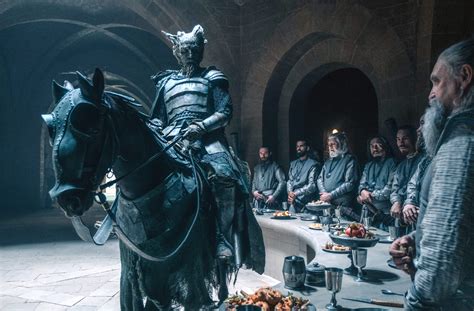
Air BnB bid me hence, sayeth they your breakfast is plentiful and cometh with the room.
“Greatest of Kings, indulge me in a Christmas game,” he growls.
Uno? Yahtzee? Mousetrap? “If one of your knights lands a blow, he receives my axe, but one year hence he must return to me to receive the same.”
The meaning of the word ‘game’ has apparently lost something over the centuries. We might define it as a contest matching wit, skill or luck, usually without lethal consequences. In King Arthur’s court it seems to mean a pointless exercise of violence matching neither skill, nor wit, nor luck and, here, at the behest of an eight-foot stalk of asparagus. Words change, definitions change, sometimes radically, for instance a ‘nice’ woman used to mean a woman who gave fellatio before she was married.
The Knight represents the ‘green man’, a puckish pagan spirit, whom, after being booted from the British soul by Christianity, can now be seen every year at Burning Man dancing naked, selling E and trading hugs for Red Bull. 14th Century readers understood what he represented and they were terrified, the make-up people instilled that foreboding awe in us, the same as in a medieval person, because my GAWD is he scary, but scary in still way. A creepy, un-Christian, dissonant way.
Gawain sees his chance to impress, he impulsively accepts, much to the concerning eye of his uncle. The giant hands him the axe, bends to one knee and offers the back of neck—and the kid chops his head off! I was thinking that this was a test of his chivalry, especially since the rules of the ‘game’ says that in a year’s time he would receive the same blow, so I figured it would be a merciful gesture, a tap on the back of the neck and a go-your-way demonstration of courtliness.
Nope. Shwing!-Whoosh!-Skut!-Thump!. The head dropped. The body wilted to the floor. Stillness.
Then a creaking sound and the headless body rises, grabs the head, holds it out like a lantern and then the face of the Green knight animates and the lips say “One year hence.” With that his body mounts his horse, holding the head, and leaving his axe with Gawain he charges out into the Christmas chill, laughing the most gut-puddling evil laugh not described by Lovecraft.
Gawain stands with the axe and an oh-shit-what-did-I-just-do look of dullardry. His uncle’s face answers: you just made an agreement to get your head chopped off next Christmas by a sentient quid of parsley, for one. Have a great year, jackass.
The next year is full of glad-handing and knightly slaps on the back for Gawain, but they are like ashes in his mouth because he must to the green knight at Christmas, before he sets off tormented by his impending death his mother gives him a magic truss, a fabric that goes around his waist that she said will forbid his death until he takes it off, a way out, a way to cheat.
So, Gawain sets off and in the episodes that follow he must prove five virtues of a knight:
Friendship: You could say that his test of Friendship was satisfied when he took the challenge of cutting the Knight’s head off from his aged uncle, this is how the poem says it, the film however puts it more to his eagerness for glory—still, Arthur was on the verge of biting off more than his old body could chew before Gawain stepped in.
Generosity: When he travels through a battle scene with corpses strewn about, he meets the younger brother of one of the dead, surely, since his brother was the breadwinner of the family, a wealthy man like Gawain could spare a coin for his family.
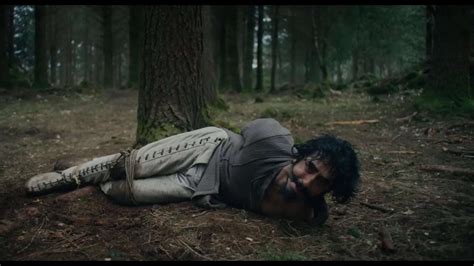
“How was I supposed to know his pronouns, he wasn’t wearing a pin–You have to wear a pin!“
Courtesy: Should one ask for gain when they help someone in trouble, and what if that person is the ghost of a young lady who was beheaded because she, in the name of Christianity, refuses to succumb to the sexual advances of her lord. This is poor Winifred, Gawain sleeps in her bed and she rouses him asking who he is, then asks a courtesy, retrieve her severed head from the bottom of the lake outside. Sure, dead lady, but what’s in it for me?
Chastity: Not far from the Green knight’s house, an overgrown structure known as The Green Chapel, is the castle of Sir Bertilak, the lady of the house is beautiful and attempts to seduce him, but he must be chaste, but he’s a young man and chastity is more an imposed torture, and he’s nearing the big fight, keeping his piddle in his tunic might not be a bad idea, plus it seems Bertilak is a raging homosexual by all the languid looks he gives Gawain over dinner. He reluctantly rebuffs the lady and tries his hardest not to interact with Bertilak, cuz’ ewwww.
Piety: Since his oath was a holy one, done on Christmas, there’s no backing out. He arrives at the Green Chapel, The Green Knight stirs himself from sleep, “You are here to finish our game?” Gawain kneels but has the magic girdle, he can survive any blow, but is that real piety, can even one virtue of a knight be ignored? The film and the poem say no.
The film shows us Gawain’s life if he keeps the girdle on, impiously betraying his vow, yes, he would become king, but his reign and his eventual end would prove brutal to all he loved. It’s better to have integrity now, lies, especially in a knight, lead to carnage.
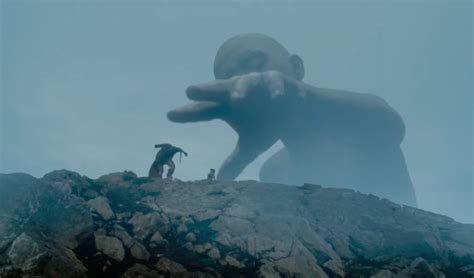
“It wasn’t an insult. Pendulous, Winnebago-sized testicles are a sign of virility!”
It is a dreamy film, filled with giants marauding in the mist and talking foxes, and in this way, it is perfect Christmas fare, the rest of the sermon is for every day, consider Gawain, consider his failures and successes, and if you frame yourself as a knight, you must play the Christmas Game without flaw, or all your New Years will be cursed.
A fine Christmas message, as opposed to say, Die Hard, whose Christmas Message seems to be ’Keep your shoes on’, which, we can all agree, is more of an Easter thing.
Leave a Reply